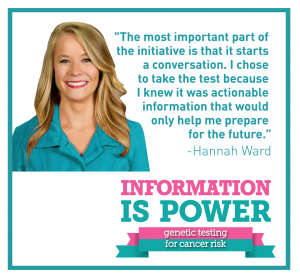
What consumer genetics tests can really tell you about cancer risks
Cancer is a disease of the genome, so it stands to reason that genetic testing can reveal some of your risk for cancer. At the HudsonAlpha Institute for Biotechnology, we have multiple partnerships offering these kinds of risk assessments. However, the test results you get back are nuanced and likely more challenging to understand than you would expect.
In order to truly receive the benefit from genetic cancer screening, you have to understand the results that get returned to you. With that in mind, let’s break down what you can learn through cancer risk screening.
 Setting the Stage
Setting the Stage
Maybe the most important thing to know before you seek cancer risk testing is that only 5-10% of cancer is considered hereditary. If you decide to take one of these tests and it comes back without an elevated risk, it does not mean you have zero cancer risk. It doesn’t even mean that your risk is lower than the rest of the population. It simply tells you that you are not genetically more likely to contract cancer from the genes in question.
Also, you should know there’s a difference between tests available in the consumer marketplace versus clinical testing, which you would get directly from a doctor or genetic counselor.
None of these tests are diagnostic tools, and they will not tell you if you have or do not have cancer. They only analyze certain genes linked to a greater hereditary risk. The reason you would opt for a test would be to stay proactive.
You might seek genetic cancer risk testing if you have a family history. You might even seek genetic testing if you yourself have a cancer diagnosis, as these tests can help guide treatment and let you know if you might pass on a risk to your children. Plenty of people seek testing simply out of curiosity.
You should know though, if you have a strong family history or a cancer diagnosis, a clinical test is most appropriate, as it is the most comprehensive. It may even be covered by insurance.
Otherwise, there are a number of consumer tests ranging in scope, cost and their ability to provide you with useful information.
 We can only know what we know…for now
We can only know what we know…for now
Genetic cancer screens are risk assessments, not crystal balls. It’s important to know that for a few different reasons.
First of all, just because you receive a positive result, meaning you tested positive for the cancer-causing mutation, does not mean that you will definitely develop that kind of cancer. It simply means you are at a greater genetic risk, and you should make plans with your doctor for how to address that risk. You might change certain lifestyle habits, like diet and exercise, or you might simply screen more aggressively going forward.
Similarly, a negative result does not mean you are at lower than average risk. It means your risk is not elevated by the particular genetic factors analyzed by that test. You may have genetic risk factors that the test is not able to find. Do not take a negative test to mean that you are risk free, especially if you have a strong personal or family history.
It’s also important to know that our understanding of the genome is incomplete. For example, there are certain cancer-causing genes that we know pretty well, like BRCA1 and BRCA2, which you may have heard about because of the links between those genes and breast and ovarian cancer. However, we know of other genes that carry a hereditary risk of cancer, and there are almost certainly risk-increasing genes we just haven’t yet discovered.
 If You Choose to Seek Testing
If You Choose to Seek Testing
There are a lot of options out there, from testing for a single specific mutation to full clinical genome sequencing to relatively simple panels conducted by companies that primarily test for ancestry.
The HudsonAlpha Institute for Biotechnology has partnered with Kailos Genetics for our Information is Power campaign. Information is Power screens more than 30 genes associated with various cancers, including breast, ovarian, prostate and colon cancer.
The test is free for select local readers and $129 otherwise.
We can’t go through every single testing option available, but we strongly encourage you to seek the advice of a physician or genetic counselor if you have questions about the best option to choose. With the wrong interpretation, these tests can lead to incorrect and even dangerous actions.
It’s also important to consider the potential for genetic discrimination – the use of your genetic information in ways that negatively impact you. There are state and federal laws that generally prohibit using genetic data to make decisions about employment or access to health insurance, but things like disability or life insurance don’t have these protections. It’s important to weigh the benefits of getting the information against the risks.
A Disease of the Genome
Cancer stems from the disruption of genes, and while it is often impossible to predict, there are certain circumstances where we do have the power to change an outcome. These screenings for cancer predisposition provide an opportunity to learn important health-related information, as long as they are understood in context.
To schedule a media interview with Dr. Neil Lamb or to invite him to speak at an event or conference, please contact Margetta Thomas by email at mthomas@hudsonalpha.org or by phone: Office (256) 327-0425 | Cell (256) 937-8210
Get the Latest Sharable Science Delivered Straight to Your Inbox!
[gravityform id=19 title=false description=false ajax=true][wprpw_display_layout id=8]


